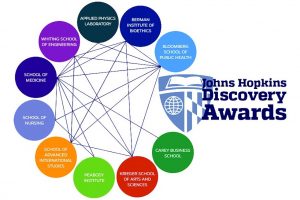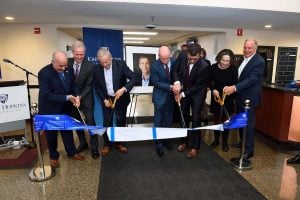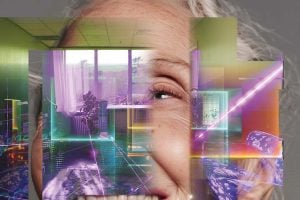
Creating a population study to track lead exposure and educational outcomes in Baltimore. Developing novel automated methods for breast cancer detection in low- and middle-income countries. Uncovering lost text in a rare 16th-century book edited by Erasmus. Using virtual reality to allow people to “enter” and explore a human brain in order to experience the brain as impacted by depressive disorder.
These are among 30 multidisciplinary endeavors that have been selected to receive support this year from Johns Hopkins University’s Discovery Awards program. Each project team is made up of members from at least two JHU entities who aim to solve a complex problem and expand the horizons of knowledge.
Altogether, the winning project teams-chosen from 190 proposals-include 108 individuals representing 11 Johns Hopkins entities. Notably, the partnerships engage the University Libraries and Museums for the first time in the program’s four award cycles. They are joined this year by all 10 university divisions.
“This year’s proposals attested to the intellectual creativity and collaborative spirit of our university,” says Ronald J. Daniels, president of Johns Hopkins University. “With these awards, faculty will have the freedom to pursue new avenues for discovery with colleagues across our community, and to take up the most pressing questions we face as a society.”
Project teams including faculty members from the Whiting School of Engineering include:
A Computational Psychiatry Approach to Investigate Effort Valuation in Major Depressive Disorder – Fernando Goes (Medicine), Vikram Chib (Medicine/Engineering) & Peter Zandi (Public Health)
A Dynamical Systems Approach to Understanding the Neural Computations Underlying our Sense of Direction – Kathleen Cullen (Medicine/Engineering), James Knierim (Arts & Sciences) & Kechen Zhang (Medicine)
An Inventory of Methane Emissions from Natural Gas Infrastructure – Scot Miller (Engineering) & Sarah Jordaan (Advanced International Studies)
Automated Breast Cancer Screening on Digital Breast Tomosynthesis (3D Mammography) Using Deep Learning Systems – Susan Harvey (Medicine) & Gregory Hager (Engineering)
Averting an Autonomous Vehicle Winter – Johnathon Ehsani (Public Health), Tak Igusa (Engineering), Tamas Budavari (Engineering), Jon Vernick (Public Health) & Lingxin Hao (Arts & Sciences)
Digital Methylation Assessment for Early Noninvasive Detection of Ovarian Cancer – Tian-Li Wang (Medicine), Thomas Pisanic (Engineering), Ie-Ming Shih (Medicine) & Jeff Tza-Huei Wang (Engineering)
Elucidating the Mechanism of Nucleosome Disruption by a Pioneer Transcription Factor – Carl Wu (Arts & Sciences), Greg Bowman (Arts & Sciences) & Taekjip Ha (Medicine/Engineering)
Engineered IGF-1 Nanoparticles to Improve Functional Recovery from Peripheral Nerve Injury – Sami Tuffaha (Medicine) & Hai-Quan Mao (Engineering)
Exotic Superconductors by Design – Jonah Erlebacher (Engineering) & Tyrel McQueen (Arts & Sciences)
Harnessing Big Data and Machine Learning to Develop Tools for Autism Risk Prediction and Intervention – Xiaobin Wang (Public Health), Nilanjan Chatterjee (Public Health), Christopher Chute (Medicine), Margaret Daniele Fallin (Public Health), Tina Cheng (Public Health) & Tak Igusa (Engineering)
Improving Disease Gene Discovery Rate with Long-Read Nanopore Sequencing – Nara Lygia Sobreira (Medicine), Christopher Bradburne (Applied Physics Lab), Michael Schatz (Engineering) & David Valle (Medicine)
Novel Methods for Non-Invasive Assessment of Myocardial Fibrosis Complexity and Disorganization to Predict Ventricular Arrhythmias – Jonathan Chrispin (Medicine), Katherine Wu (Medicine), Mauro Maggioni (Engineering), Steven Jones (Medicine), David Okada (Medicine) & Natalia Trayanova (Engineering)
Photoacoustic Image Guidance of Gynecological Surgeries – Muyinatu Bell (Engineering) & Karen Wang (Medicine)
Targeting Collective Invasion in Pancreatic Ductal Adenocarcinoma – Laura Wood (Medicine) & Joel Bader (Engineering)
Ultrasound Imaging of Voltage Membrane Abnormality: A Potential Prostate Cancer Detection Technology – Emad Boctor (Medicine), Zaver Bhujwalla (Medicine), Maged Harraz (Medicine), Ralph Etienne-Cummings (Engineering) & Martin Pomper (Medicine)
Uncovering Forbidden Fruit – Patricia McGuiggan (Engineering), Tamas Budavari (Engineering), Jennifer Jarvis (Libraries), Andrea Hall (Libraries) & Alex Szalay (Arts & Sciences)
Excerpted and adapted from The Hub. Read the full list of award recipients.


